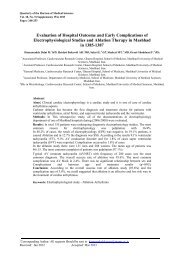Encyclopedia of Computer Science and Technology
Encyclopedia of Computer Science and Technology
Encyclopedia of Computer Science and Technology
Create successful ePaper yourself
Turn your PDF publications into a flip-book with our unique Google optimized e-Paper software.
social impact <strong>of</strong> computing 439Stratification v. OpportunityIn the past 30 years, the computer has created millions <strong>of</strong>new jobs, ranging from webmaster to support technicianto Internet café proprietor (see employment in the computerfield). Millions <strong>of</strong> other jobs have been redefined:The typist has become the word processor, for example.Many other jobs have disappeared or are in the process<strong>of</strong> disappearing—such as travel agents, who have foundthemselves under pressure both from do-it-yourself Internetbooking <strong>and</strong> the airlines deciding that they no longerneeded to give agents incentives for booking.In a rapidly changing technological <strong>and</strong> economic l<strong>and</strong>scape,there are always emerging opportunities. The primacy<strong>of</strong> computer skills in the job market has, however,exacerbated a trend that was seen throughout the 20thcentury. New, well-paid jobs increasingly require technicaltraining <strong>and</strong> skills—exp<strong>and</strong>ing the definition <strong>of</strong> “functionalliteracy.” Throughout the second half <strong>of</strong> the century,the traditional blue-collar factory jobs that could assure acomfortable living for persons with only a high school educationhave become increasingly scarce. This has been theresult both <strong>of</strong> increasingly competitive (<strong>and</strong> lower-priced)overseas labor <strong>and</strong> factory automation (see robotics) athome. Essentially, the well-paid tech sector <strong>and</strong> the lowpaidservice sector have grown rapidly, while the ground inbetween has eroded.Sometimes jobs don’t disappear, but are “dumbed down,”becoming low-skill <strong>and</strong> low-paid. Fifty years ago, a storeclerk had to be able to count up from the cash register totalto the amount <strong>of</strong> money presented by the customer. Today,computerized cash registers tell the clerk exactly how muchchange to give (<strong>and</strong> <strong>of</strong>ten dispense the coins automatically).Old-style clerks had to know about prices, discounts, <strong>and</strong>special <strong>of</strong>fers. Today these are h<strong>and</strong>led automatically bybar codes <strong>and</strong> smart cards. Although the supermarket clerkstill is moderately well paid, the ultimate end <strong>of</strong> the processis seen in the fast food clerk, who <strong>of</strong>ten needs only pushbuttons with pictures <strong>of</strong> food on them. He or she is likelyto be paid little more than minimum wage. The impact <strong>of</strong>technology on jobs can even go through several stages. Forexample, skilled photo technicians have been replaced bythe use <strong>of</strong> automated photo processing equipment. In turn,however, the growing use <strong>of</strong> digital cameras is reducing theuse <strong>of</strong> film-based photography in general.The result <strong>of</strong> these trends may well be increased socialstratification. The best jobs in the information age requireskills such as programming, systems analysis, or the abilityto create multimedia content. However, the opportunityto acquire such skills varies <strong>and</strong> is not evenly distributedthrough all groups in the population (see digital divide).Although minority groups are now catching up in terms <strong>of</strong>access to computers at home <strong>and</strong> in school, disparities inthe quality <strong>of</strong> education will only be magnified as technicalskills increasingly correlate with good pay <strong>and</strong> benefits.At the same time the computer <strong>of</strong>fers powerful newtools for education (see education <strong>and</strong> computers).Potentially, this could overcome much <strong>of</strong> the disadvantages<strong>of</strong> poverty because once the threshold <strong>of</strong> access is met, thepoor person’s Internet is much the same as that availableto the privileged. However, mastering the necessary skillsrequires both provision <strong>of</strong> adequate resources <strong>and</strong> that prevailingcultural attitudes support intellectual achievement.Dependency v. Empowerment<strong>Computer</strong>s have made people more dependent in someways while empowering them in others. Society is increasinglydependent on computers to operate the systems thatprovide transportation, power, <strong>and</strong> communications infrastructure.The “y2k” scare at the end <strong>of</strong> the century provedto be unfounded, but it did give people a chance to considerwhat a major, prolonged failure in the information infrastructurewould mean for maintaining the physical necessities<strong>of</strong> life, the viability <strong>of</strong> the economy, <strong>and</strong> the cohesion<strong>of</strong> society itself (see Y2K problem). The terrorist attacks <strong>of</strong>September 11, 2001, brought to greater public awarenessthe concerns about “cyberterrorism” that experts had beendebating since the late 1990s. (See cyberterrorism.)At the same time, computers—<strong>and</strong> particularly theInternet—have give individuals a greater feeling <strong>of</strong> empowermentin many respects. The savvy Web user now hasnumerous ways to shop for everything from airline ticketsto Viagra pills at prices that reflect disintermediation—the elimination <strong>of</strong> the middleman. Many people are lessinclined to take the word <strong>of</strong> traditional authority figures(such as doctors) <strong>and</strong> instead are tapping into the sort <strong>of</strong>information that had been previously been accessible onlyto pr<strong>of</strong>essionals. However, access to information is not thesame thing as having the necessary background <strong>and</strong> skillsto evaluate that information. Whether falling victim to anoutright scam or simply not fully underst<strong>and</strong>ing the consequences<strong>of</strong> a decision, the Web user finds little in the way<strong>of</strong> a regulatory safety net. The tension between the highdegree <strong>of</strong> regulation now existing in much <strong>of</strong> our society<strong>and</strong> the frontierlike qualities <strong>of</strong> cyberspace will no doubt bea major theme in the next few decades.Centralization v. DemocracyWith new forms <strong>of</strong> media technology (such as radio <strong>and</strong>television in the 20th century), early innovators <strong>and</strong> experimentershave considerable freedom to experiment <strong>and</strong>express themselves. This freedom is largely the result <strong>of</strong>lack <strong>of</strong> pressure from powerful economic interests whilethe new technology is largely still “under the radar.” However,as a technology matures, large corporate interests tendto consolidate the market, leaving fewer opportunities forsmaller, independent operators.By the late 1990s there was some concern that theInternet <strong>and</strong> World Wide Web were entering such a consolidationstage in the wake <strong>of</strong> such developments as theAOL/Time-Warner merger. However, while there are nowlarge corporate presences online, the diversity <strong>of</strong> the means<strong>of</strong> expression has actually increased (see blogs <strong>and</strong> blogging,user-created content, wikis <strong>and</strong> Wikipedia, <strong>and</strong>YouTube). Further, the influence <strong>of</strong> activist groups hasincreased to the point where any serious political campaigngives high priority to its Internet presence <strong>and</strong> the cultivation<strong>of</strong> influential bloggers (see political activism <strong>and</strong>the Internet).

















